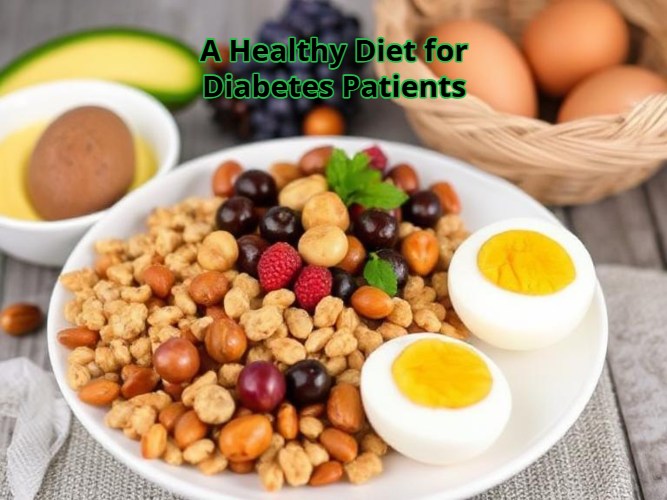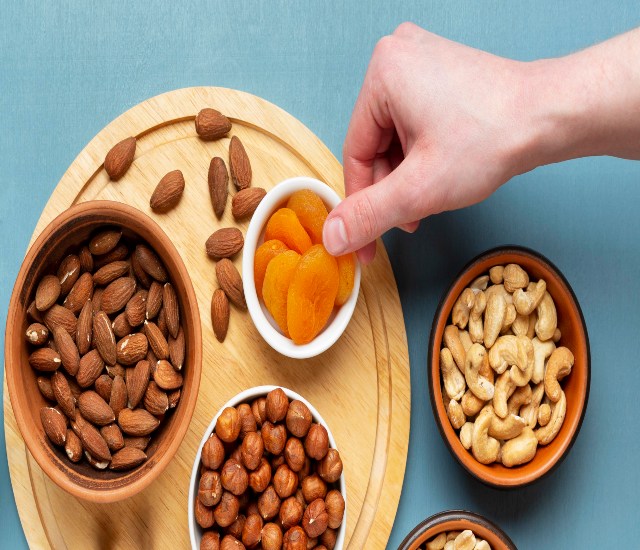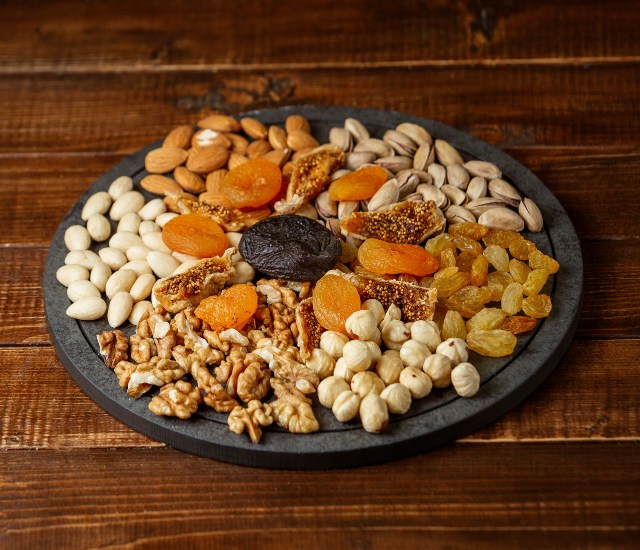Managing diabetes requires careful dietary choices that help regulate blood sugar levels while providing essential nutrients. A well-balanced diet can improve insulin sensitivity, reduce complications, and boost overall health. Incorporating foods rich in fibre, healthy fats, and proteins while limiting processed sugars and refined carbohydrates is key.
Whether you have Type 1 or Type 2 diabetes, focusing on nutrient-dense foods like chia seeds, pumpkin seeds, pista dry fruit, and almonds can be beneficial. Additionally, staying hydrated and maintaining a regular eating schedule helps manage glucose levels efficiently. Let’s explore the best food choices for diabetics and how to incorporate them into daily meals.
Best Food Groups for Diabetics
1. Fruits and Vegetables
Fruits and vegetables are essential in a diabetic diet as they provide vitamins, minerals, and fibre that help regulate blood sugar levels. However, some fruits contain high natural sugars, so portion control is crucial.
Best Fruits for Diabetic Patients:
- Berries: Blueberries, strawberries, and raspberries are packed with antioxidants and have a low glycaemic index (GI), making them ideal for controlling sugar levels.
- Citrus Fruits: Oranges, lemons, and grapefruits offer vitamin C and fibre without spiking blood sugar.
- Apples and Pears: Their high fibre content slows glucose absorption, preventing rapid blood sugar spikes.
Best Vegetables for Diabetes:
- Leafy Greens: Spinach, kale, and broccoli provide essential micronutrients and fibre, promoting better digestion and stable glucose levels.
- Cruciferous Vegetables: Cabbage, cauliflower, and Brussels sprouts support digestion and metabolic health.
- Bell Peppers and Carrots: These offer antioxidants and vitamins that aid blood sugar control and promote overall wellness.
2. Protein-Rich Foods
Protein helps stabilise blood sugar and promotes satiety, reducing the risk of unhealthy snacking and overeating.
Healthy Protein Sources:
- Lean Meats: Chicken, turkey, and fish are excellent choices that provide high-quality protein without unhealthy fats.
- Eggs: A great source of high-quality protein, essential vitamins, and healthy fats.
- Legumes: Lentils, chickpeas, and black beans offer plant-based protein and fibre, making them great alternatives for vegetarians.
- Nuts & Seeds: Almonds, pumpkin seeds, and chia seeds provide protein, fibre, and healthy fats that benefit blood sugar control and overall heart health.
3. Dairy Foods
Dairy products contain protein, calcium, and probiotics that contribute to gut health and overall well-being.
Best Dairy Options for Diabetics:
- Greek Yoghurt: High in protein and probiotics, it supports digestion and helps maintain stable blood sugar levels.
- Low-fat Milk: Provides calcium and essential vitamins without excessive saturated fats.
- Cottage Cheese: A good source of protein, calcium, and low in carbohydrates, making it a diabetic-friendly dairy option.
4. Fibre-Rich Foods
Fibre slows down digestion and the absorption of sugar, preventing sudden spikes in blood glucose levels and promoting better digestion.
Top Fibre-Rich Foods for Diabetics:
- Whole Grains: Oats, quinoa, and brown rice are better than refined grains as they provide essential nutrients and fibre.
- Legumes: Beans and lentils are rich in both fibre and protein, making them excellent choices for a diabetic diet.
- Seeds: Chia seeds and pumpkin seeds help regulate blood sugar, improve digestion, and promote overall health.
- Nuts: The nutritional value of almonds makes them an excellent fibre source, helping to control appetite and prevent blood sugar spikes.
Healthy Eating for Diabetic Patients
1. Breakfast
- Start the day with a balanced meal that provides energy without spiking blood sugar.
- Scrambled eggs with spinach and whole-grain toast, offering protein and fibre.
- Greek yoghurt with chia seeds and berries, packed with antioxidants and healthy fats.
- Oats with a sprinkle of pista dry fruit and almonds, providing essential nutrients for a great start to the day.
2. Lunch/Dinner
- Focus on lean proteins, vegetables, and complex carbohydrates for a well-rounded meal.
- Grilled chicken with quinoa and roasted vegetables, offering essential nutrients and protein.
- Lentil soup with a side of mixed greens, a plant-based meal rich in fibre and protein.
- Baked salmon with brown rice and steamed broccoli, full of healthy fats, protein, and complex carbs.
3. Snacks
- Smart snacking helps keep blood sugar stable between meals.
- Handful of pumpkin seeds or almonds, packed with healthy fats and fibre.
- Cottage cheese with sliced cucumber, a protein-rich and refreshing snack.
- Hummus with carrot sticks, a great combination of fibre and protein.
Also read - Why snack healthy in between meals and meets?
A well-balanced diet plays a crucial role in managing diabetes. By incorporating nutrient-dense foods like chia seeds, pumpkin seeds, pista dry fruit, and almonds, individuals can maintain stable blood sugar levels while enjoying delicious meals. Choosing high-fibre, protein-rich, and healthy fat sources can support long-term health and well-being. Staying hydrated, engaging in regular physical activity, and monitoring portion sizes are equally important. For premium quality dry fruits and seeds, brands like Happilo offer excellent options that ensure freshness and nutritional value, helping you maintain a diabetes-friendly diet effortlessly.
Frequently Asked Questions
Q1. Which good fats should be included in a sugar patient diet?
Good fats for diabetics include nuts like pista dry fruit, almonds, and seeds such as chia and pumpkin seeds. Avocados, olive oil, and flaxseeds are also excellent sources of healthy fats that support heart health and cholesterol levels.
Q2. Which are the best fruits for diabetic patients?
Berries, citrus fruits like oranges and lemons, and fibre-rich apples and pears are great choices. They have a low glycaemic index, helping maintain stable blood sugar levels.
Q3. How good are chia seeds for a diabetes patient?
Chia seeds are highly beneficial due to their high fibre content, which helps regulate blood sugar levels. They are also rich in omega-3 fatty acids, promoting heart health and reducing inflammation.




Leave a comment
All comments are moderated before being published.
This site is protected by hCaptcha and the hCaptcha Privacy Policy and Terms of Service apply.